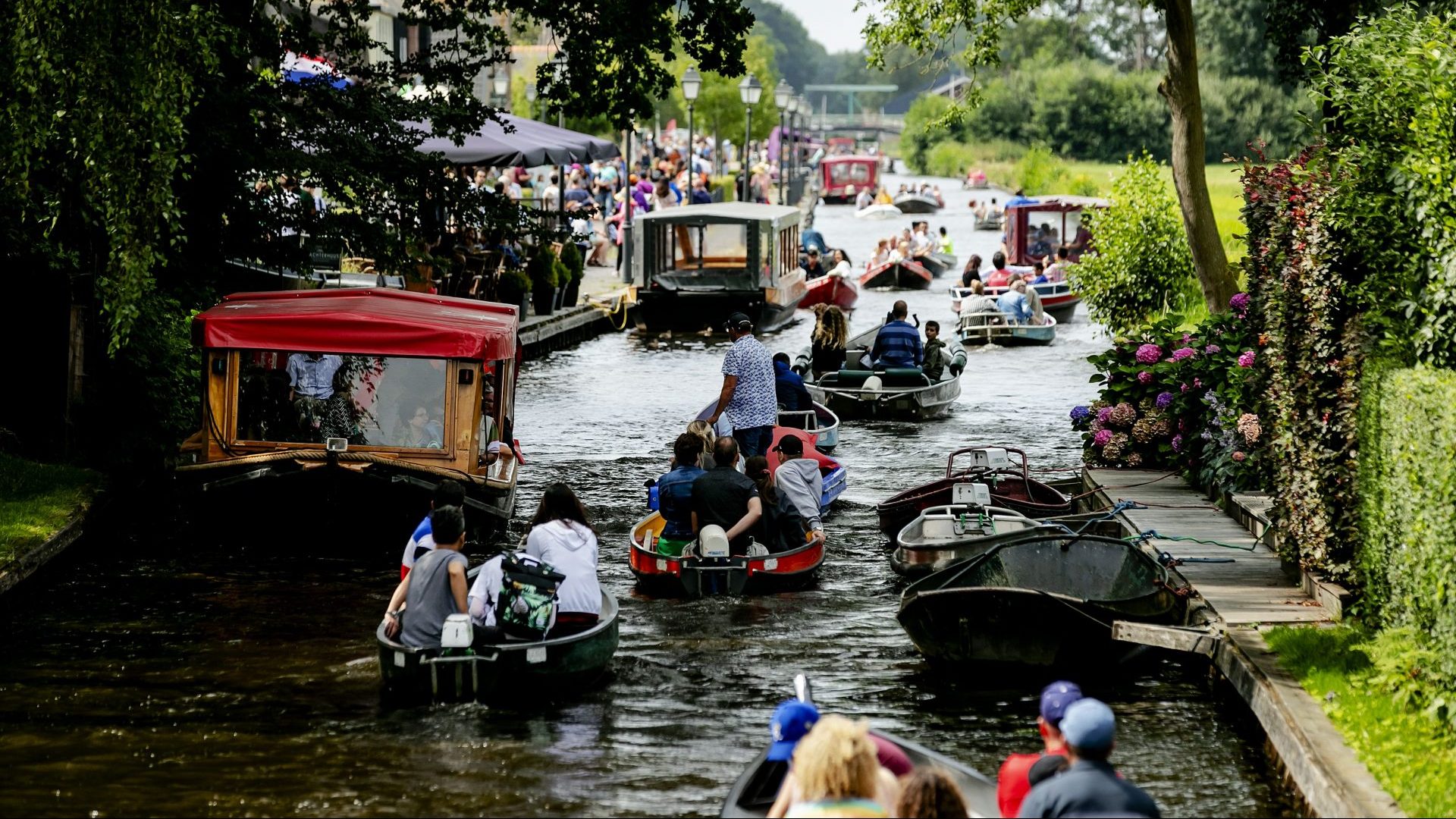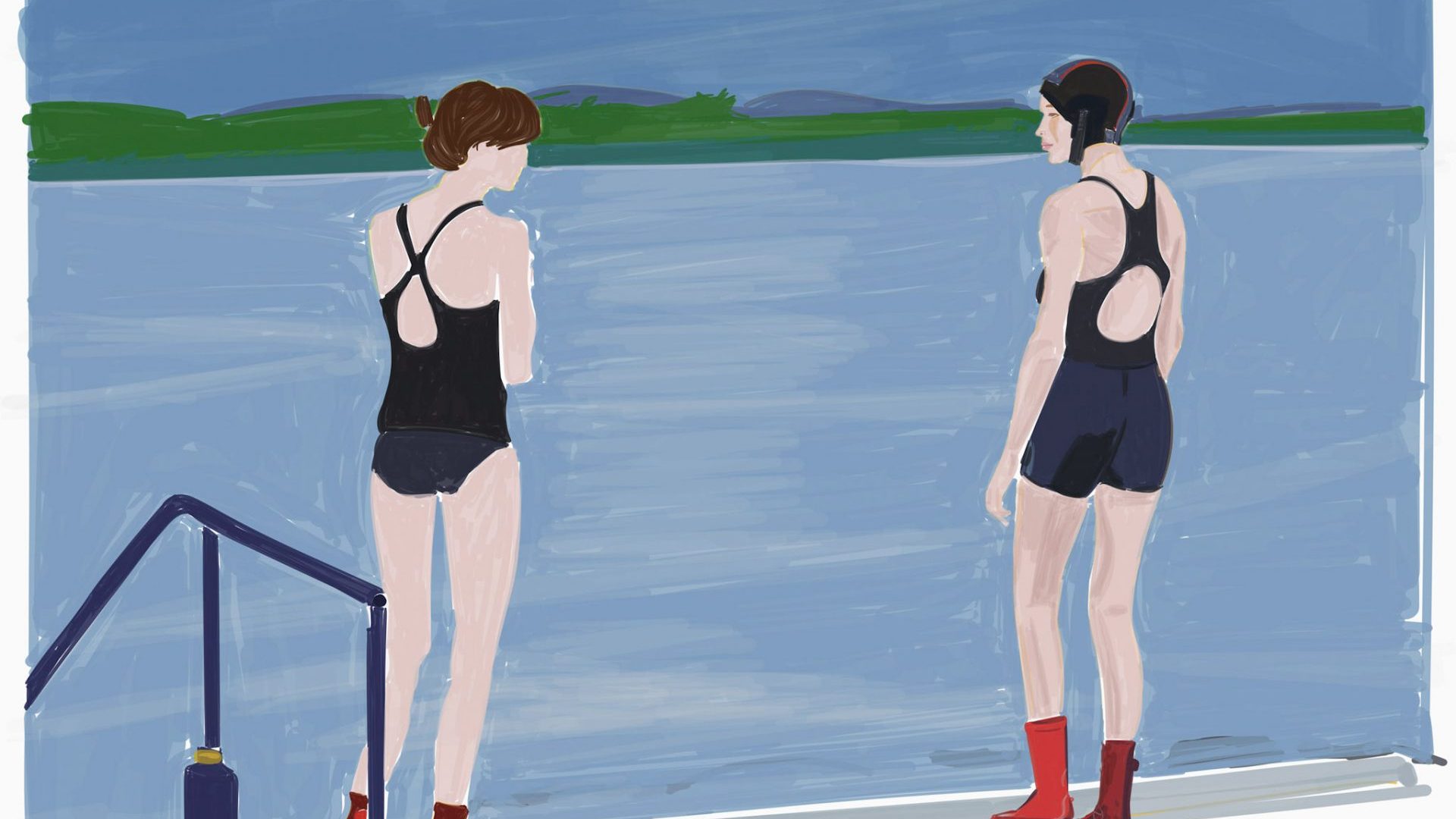In the north of the Netherlands, about halfway between Amsterdam and Groningen, is the village of Giethoorn. It’s really pretty; all thatched cottages
surrounded by neatly tended gardens bursting with flowers and lawns immaculately cropped. Enhancing Giethoorn’s prettiness is how most of it
is only traversable by water. No cars, no vans, no lorries, just boats, bridges and towpaths.
Centuries of peat-digging created channels that filled with water and effectively cast each dwelling adrift on its own tiny island. Groceries and post arrived by boat and the villagers, who today number around 2,600, moved around via the 180 little bridges that criss-cross the waterways.
Giethoorn quietly got on with things until 1958, when film director Bert Haanstra turned up and made Fanfare, a heartwarming comedy that became
one of the best-loved and most commercially successful films ever produced in the Netherlands and changed Giethoorn for ever.
Screen fame brought crowds in serious numbers before word of the idyllic watery village spread beyond Dutch cinema enthusiasts to bring tourists from all over the world.
These days you can barely move in Giethoorn during peak season. Little boats inexpertly navigated and hired by the hour jostle packed tour vessels
nosing through with noisy commentaries while the narrow footpaths heave with people taking group shots and selfies. There are signposts and information boards everywhere, souvenir shops, cheese shops and huge coach parks on the outskirts of the village. Inevitably some of the houses are on AirBnB.
Before the pandemic, more than a million people visited every year, 350,000 of them from China alone, where Giethoorn is so popular there’s a lifesize replica in a Disney theme park in Shanghai. Thanks to literal Disneyfication, you no longer have to visit Giethoorn to visit Giethoorn.
If you do head for the actual Giethoorn, to what extent is it the actual Giethoorn? The core of its appeal, the unspoiled tranquillity of its watery location, is long gone. Even its Instagrammability is negated when between your phone and the lovely thatched cottage is a forest of selfie sticks and half a dozen boats.
As global tourism returns from its Covid hiatus into a riot of flight cancellations and Leavers getting the hump about the massive passport queues they voted to introduce, it’s possibly a good time to reflect on the nature of tourism and what it means to us as citizens, Europeans and tourists.
Giethoorn is a fascinating case study, a place whose entire existence now
revolves around tourism. They call it, like several dozen other places north of Venice, the “Venice of the North”. Around 36 million people pass through
Venice every year, but where once there were 125,000 Venetians with their own dialect, industries and an extraordinary history, now barely 50,000 people live in the tourist-choked city shaken to its foundations by the throbbing engines of vast cruise ships.
Giethoorn and Venice both feature in Grand Hotel Europa, a sprawling 2018 novel by the Dutch writer Ilja Leonard Pfeijffer just published in Michele Hutchison’s English translation. Ostensibly the story of a writer named, erm, Ilja Leonard Pfeijffer who takes up residence in the eponymous hotel to recover from the end of an intense relationship with an Italian art historian, Grand Hotel Europa is a deep examination of Europe past and present, with
particular emphasis on the nature of its tourism.
The hotel is one of those classy, old-fashioned, golden age ones eulogised in print by Joseph Roth and immortalised on screen most recently by Wes Anderson in The Grand Budapest Hotel. Its Mitteleuropa location isn’t specified because the hotel isn’t necessarily to be taken literally. From its unctuously obliging maitre-d, Montebello, to its young bell boy, Abdul, recently arrived as a refugee from north Africa, via a scatter of superficially drawn permanent residents, the Europa is our continent in bricks and mortar.
Its grandeur is fading – the fountain doesn’t work and the rose garden, once tended lovingly by an elderly curator who addressed the bushes in Latin, is overgrown – but it’s clinging on thanks to an in-built nostalgia for better times. A musty air of Habsburg dignity covers shortcomings: suspended over the lobby is a once-magnificent crystal chandelier whose majesty is still apparent despite its shabbiness, while on the wall is a portrait of Niccolò Paganini, who liked the steak au girolles in the restaurant so much he gave a recital right there, in the lobby.
Then the hotel is purchased by Mr Wang, a Chinese businessman, and things begin to change. The chandelier is replaced by a Swarovski crystal creation with LED lights that change colour and the Paganini portrait is removed in favour of a generic image of Paris. The long-established Chinese Room, decorated with imitation art and pottery, is ripped out and remodelled as a traditional English pub, all dark timberwork, horse brasses and hunting prints. Chinese tourists start arriving by the coachload and the hotel is saved, but at what cost to its authentic Europeanness?
The Europa-as-Europe analogy is not subtle but this is not a subtle book.
Pfeijffer has much to get off his chest and he certainly does that over the 500
pages of this absorbing, flawed, enjoyable and occasionally frustrating novel.
Grand Hotel Europa ranges across the continent from the Netherlands to
Malta following the fictional Pfeijffer’s wistful recollections of travels with his art historian lover, Clio (also the name of the Ancient Greek muse of history – see above re: subtlety) in search of a lost Caravaggio. Pfeijffer meets Clio, the daughter of a marchioness, in Genoa and they embark on a stormy
relationship that allows both plenty of scope to demonstrate what terrible people they are.
Hugely pleased with themselves, the pair are riddled with the snobbery of the privileged. “What are all these people doing here?” hisses Clio while looking at Caravaggios in Malta. “What’s an American, whose entire cultural baggage consists of being able to tell two kinds of cola apart, to make of the existential fears of a complex, ambiguous artist like Caravaggio?”
One of the book’s funniest passages sees the pair clambering over the altar of an ancient chapel to photograph the artwork above it, knocking ceremonial items to the floor while sneering about the tourists watching them who are understandably appalled.
It’s effectively done, and a rare moment when Pfeijffer shows us the point he’s making rather than poking us in the chest and telling us, at length. The book’s weaker sections are long monologues by a range of peripheral characters, from ambassadors to taxi drivers, hammering home lengthy messages about the perils of European tourism supported by a wealth of statistics tossed out apparently off the top of their heads.
Whenever Pfeijffer meets a fellow Europa resident for dinner, you know you’re in for a long speech that must surely leave their untouched meal stone
cold. When the protagonist and Clio first meet she unburdens herself of her
entire life story and opinions on contemporary Italy uninterrupted across six pages before disappearing into the bathroom and returning naked but for stockings and high heels, revealing her “biteable buttocks” and “racy breasts” that are “as juicy as cherries” before they have sex (“like a sword into a scabbard”). Yep, this being a literary novel by a middle-aged man there is quite a bit of middle-aged man fantasy – a scene where the fiftysomething Pfeijffer has sex with a precocious, gum-chewing teenage girl makes particularly icky reading.
Despite these flaws the strongest aspect of the novel is in its meditation on Europe and particularly our continent’s dependence on nostalgia. The hotel runs on it, the tourism industry runs on it and, as Pfeijffer argues, Europe itself runs on it. After all, even the greatest advance in European culture was called the Renaissance and towards the end of the book there’s a gathering of old European nobility, a beautifully constructed eulogy blending wistfulness and anachronism that could have come straight out of Roth or Stefan Zweig.
Nostalgia wins you tourists but of course it’s not history. National governments want to milk the former but not necessarily face the truth of the latter, and not just in statue-obsessed Britain either. In Skopje, Pfeijffer broods on a string of statues of great figures from Macedonian history installed in 2014 to present at best a skewed version of the road to nationhood.
“A new country has no future without a past,” Pfeijffer observes. “It’s an exclusively European tendency to want to have a past above all else.”
“We’ve got so much of it in Europe,” says Elena, his Macedonian host, “so much of the bloody past.”
“And if we don’t, they invent it,” says Pfeijffer, “like they have here.”
“Don’t let the nationalists hear you,” she replies. “To them, this past genuinely happened.”
Grand Hotel Europa by Ilja Leonard Pfeijffer, translated by Michele Hutchison, is published by 4th Estate, price £18.99




